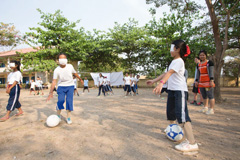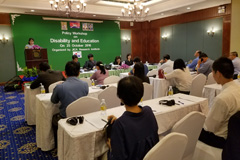Research Results on “Disabilities and Education” Presented in Cambodia, Thailand, and China - Research Fellow Kameyama and her group
2016.12.20
JICA-RI Research Fellow Yuriko Kameyama and her group gave presentations in Cambodia on October 25, 2016, on research results on a JICA-RI project “Disabilities and Education.” The seminar was held for education officials in Cambodia, one of the target countries of the research project. They also shared their research results at international conferences held in Thailand and China around the same time.
At the seminar in Cambodia, Lead researcher Kazuo Kuroda (JICA-RI Visiting Fellow and Professor at Waseda University) explained international trends in “Disabilities and Education,” while Kameyama introduced the research background and survey methods. Then, Kuroda and co-researcher Diana Kartika (Waseda University Graduate School) reported survey results. They showed that teachers' attitudes towards inclusive education were positive on the whole, and that—against the researchers’ expectations—neither training nor experience of teachers in teaching children with disabilities have a significant impact on teachers' perceptions of inclusion in Cambodia. On the other hand, they discussed that the type of disabilities affect teachers' perceptions as to including them in regular classes and that severe sensory impairments are perceived much more negatively for inclusion in Cambodia as compared to developed countries.

Cambodian elementary students play blind soccer
(Photo: JICA/Shinichi Kuno)
JICA-RI Research Assistant Yuji Utsumi presented the results of a survey focusing on the situation of out-of-school children with disabilities in Cambodia. Utsumi explained that the risk of dropping out of school was higher for children with disabilities than for children without disabilities based on the comparison of age distribution. He said the children with disabilities dropped out of school the most in Grade 1 of primary school. In many cases, he said, children with disabilities do not attend formal schools because of reasons not directly related to school; for instance, the child’s disability itself, inability to make necessary transportation arrangements for getting to/from school, and lack of financial availability. He also pointed out that the proportion of children with disabilities who have been rejected from enrollment is 2.5 times higher for girls than for boys and that girls also have a higher rate of not attending school because of their work inside or outside of their home.
Following the presentation, a panel discussion was held featuring Sam Sideth Deputy Director-General for Education at the Cambodian Ministry of Education, and NGO officials. Kameyama later said, “It was an outstanding opportunity for researchers, practitioners in education cooperation, education professionals, and Cambodian government officials to gather in order to share experiences and research results from ongoing projects. The event gave key players a chance to consider how to reflect these experiences and results into actual policies.”
Kameyama also participated in the 18th UNESCO-APEID (Asia and the Pacific Programme of Educational Innovation for Development) International Conference which was held in Bangkok, Thailand from October 26 to 28. At the conference, Kameyama presented analytical results from attitude surveys of teachers and parents in regards to barriers for education of children with disabilities in Mongolia. She said there is a high level of awareness for barriers, including a lack of facilities and equipment, lack of monetary incentives for teachers, and lack of school budgets. In order to pursue inclusive education policy, Kameyama suggested the need to overcome these monetary barriers, to hold teacher training, to realize cooperation between parents and teachers, and to achieve cooperation between regular and special schools.

Various stakeholders join the seminar in Cambodia
The conference was attended by about 20 officials from UNESCO, international NGOs, such as Save the Children, and Cambodian NGOs. In addition to questions regarding the effects of teacher training, discussions were held on the form of education for children with severe disabilities and for issues related to lack of funding and mainstreaming of inclusive education within international educational cooperation. Kuroda explained that the purpose of the research project is to encourage policy dialogue by researching education for children with disabilities in developing nations where there is a small amount of scientific evidence. He also introduced how the Cambodian Ministry of Education has established an official Inclusive Education Bureau to serve as coordinator of development partners, and discussed the contents of JICA projects in Mongolia.
Prior to the presentations in Cambodia and Thailand, Kameyama also presented the said research results at the XIV World Congress of Comparative Education Societies which was held in Beijing, China from August 21 to 24.

事業事前評価表(地球規模課題対応国際科学技術協力(SATREPS)).国際協力機構 地球環境部 . 防災第一チーム. 1.案件名.国 名: フィリピン共和国.

事業事前評価表(地球規模課題対応国際科学技術協力(SATREPS)).国際協力機構 地球環境部 . 防災第一チーム. 1.案件名.国 名: フィリピン共和国.

事業事前評価表(地球規模課題対応国際科学技術協力(SATREPS)).国際協力機構 地球環境部 . 防災第一チーム. 1.案件名.国 名: フィリピン共和国.

事業事前評価表(地球規模課題対応国際科学技術協力(SATREPS)).国際協力機構 地球環境部 . 防災第一チーム. 1.案件名.国 名: フィリピン共和国.

事業事前評価表(地球規模課題対応国際科学技術協力(SATREPS)).国際協力機構 地球環境部 . 防災第一チーム. 1.案件名.国 名: フィリピン共和国.
scroll